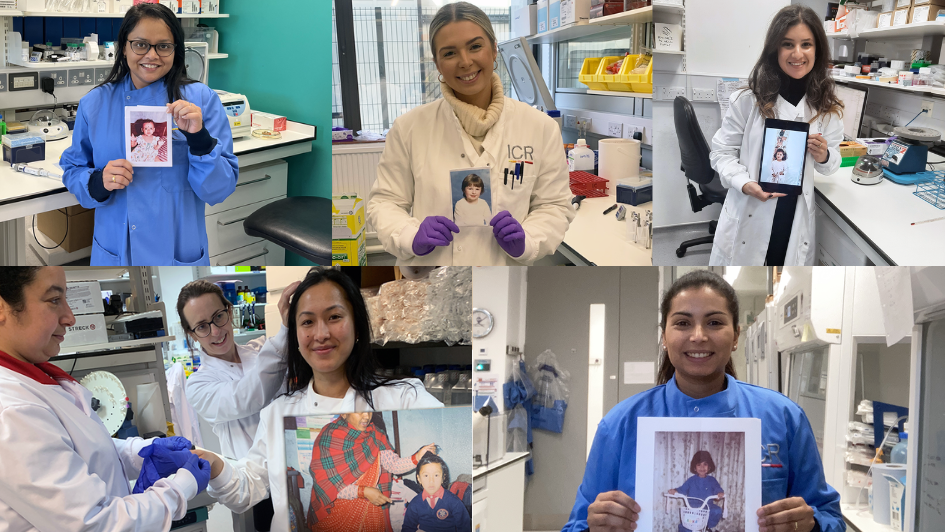
Growing up, our dreams and aspirations are greatly influenced by our role models and the support we receive in following our interests. For International Day of Women and Girls in Science, we asked five of the ICR’s researchers who it was that encouraged them to choose a career in STEM (science, technology, engineering and mathematics) that would lead them to become today’s cancer scientists.
Supriti Ghosh – childhood sarcoma researcher
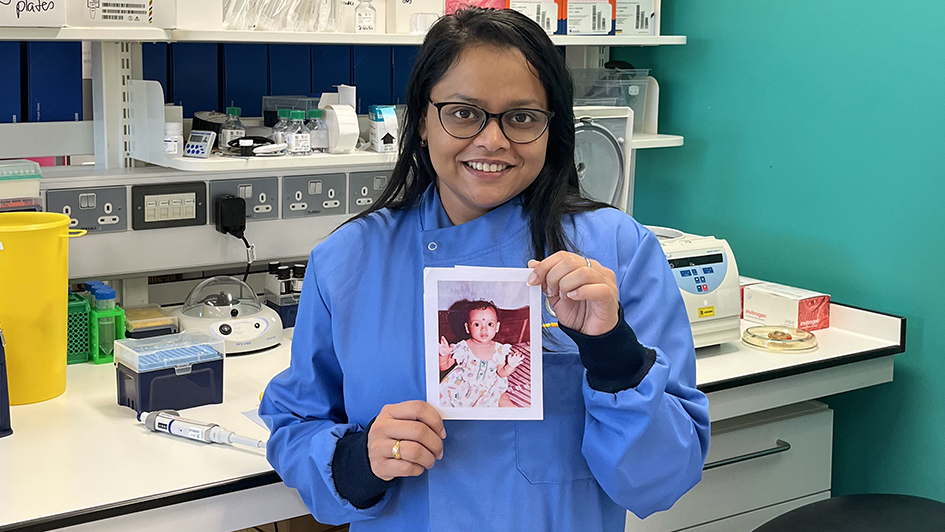
Image: Dr Supriti Ghosh is a Postdoctoral Training Fellow in the Sarcoma Molecular Pathology Team, led by Professor Janet Shipley.
Supriti joined the ICR in 2022 and her research focuses on the identification of quantitative blood-based biomarkers for better diagnosis, prognosis, and therapy of paediatric rhabdomyosarcoma – an aggressive disease with limited therapeutic options.
Throughout her school years, Supriti’s career goals were constantly changing. She had wanted to become everything from a playback singer in Bollywood films, to a fighter pilot for the defence services, and a neurosurgeon. But as she grew older, she found herself feeling more drawn towards science.
“As I progressed to do my undergraduate degree, I fell in love with science and research, a little more each year, until my decision finally came to rest on cancer research.”
Her passion for science was born out of “a curiosity to explore and understand the many facets of a scientist’s work”. Supriti acknowledges the continuous encouragement and support from her parents which urged her to discover interesting areas of study.
As she explored the vast options that science had to offer, she became interested in the fields of biotechnology and oncology. She explains that her parents had wanted her to become a clinician, however, when they realised that she was looking for something much more challenging, they fully supported her decision to pursue a career in cancer research.
Supriti loves working in research because “every day is different, and the thrill of the chase never ends”.
“Cancer is one of the most significant and damaging scourges of our lifetime,” she says. “Since it has so much variety and is so insidious and unpredictable, cancer research becomes a field where the possibilities are endless, the directions are multiple, and the rewards are pathbreaking. So, by doing cancer research I solve mysteries, I find answers to questions on the molecular basis of the diseases, I help to find better diagnostic and therapeutic options, and as a result, I help to improve the quality of life of the patients. Is there a better reward?”
Sumana Shrestha – childhood brain tumour researcher
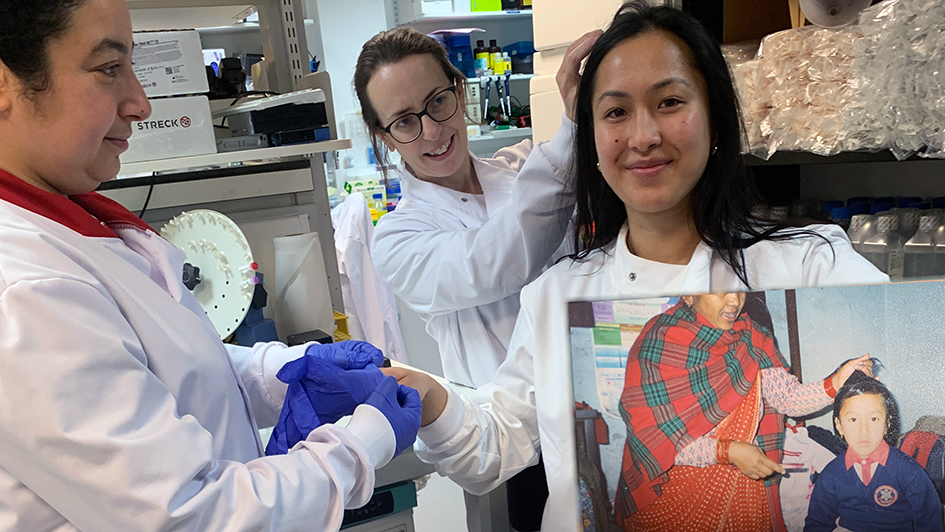
Image: Sumana Shrestha joined Professor Louis Chesler’s Paediatric Tumour Biology team at the ICR in 2019.
Sumana’s PhD work aims to develop better models for studying childhood brain tumours with the hope that they can be used to improve understanding of the disease and develop new treatments.
Growing up in Kathmandu, Nepal, Sumana developed a great love for the outdoors. From spending time in nature, she also grew a love of running, which influenced Sumana’s early career goals.
“At school, I initially favoured sports and art as they allowed me to express my creativity and competitiveness. Due to this I wanted to be either an athlete or a designer!”
As well as a love of art, Sumana’s parents encouraged her to study science, but it was after seeing a piece of art by the brain and neuroscience artist, Dr Gregg Dunn that Sumana realised she could combine her two passions. She explains that “this was a pivotal moment as it opened my eyes to the dynamic forms of science, and I was excited to the possibility of combining my love for art with my blossoming interest in neuroscience”.
In the first year of her PhD, Sumana won the ICR’s annual Science and Medical Imaging Competition with her vibrant image of differentiating brain cancer cells.
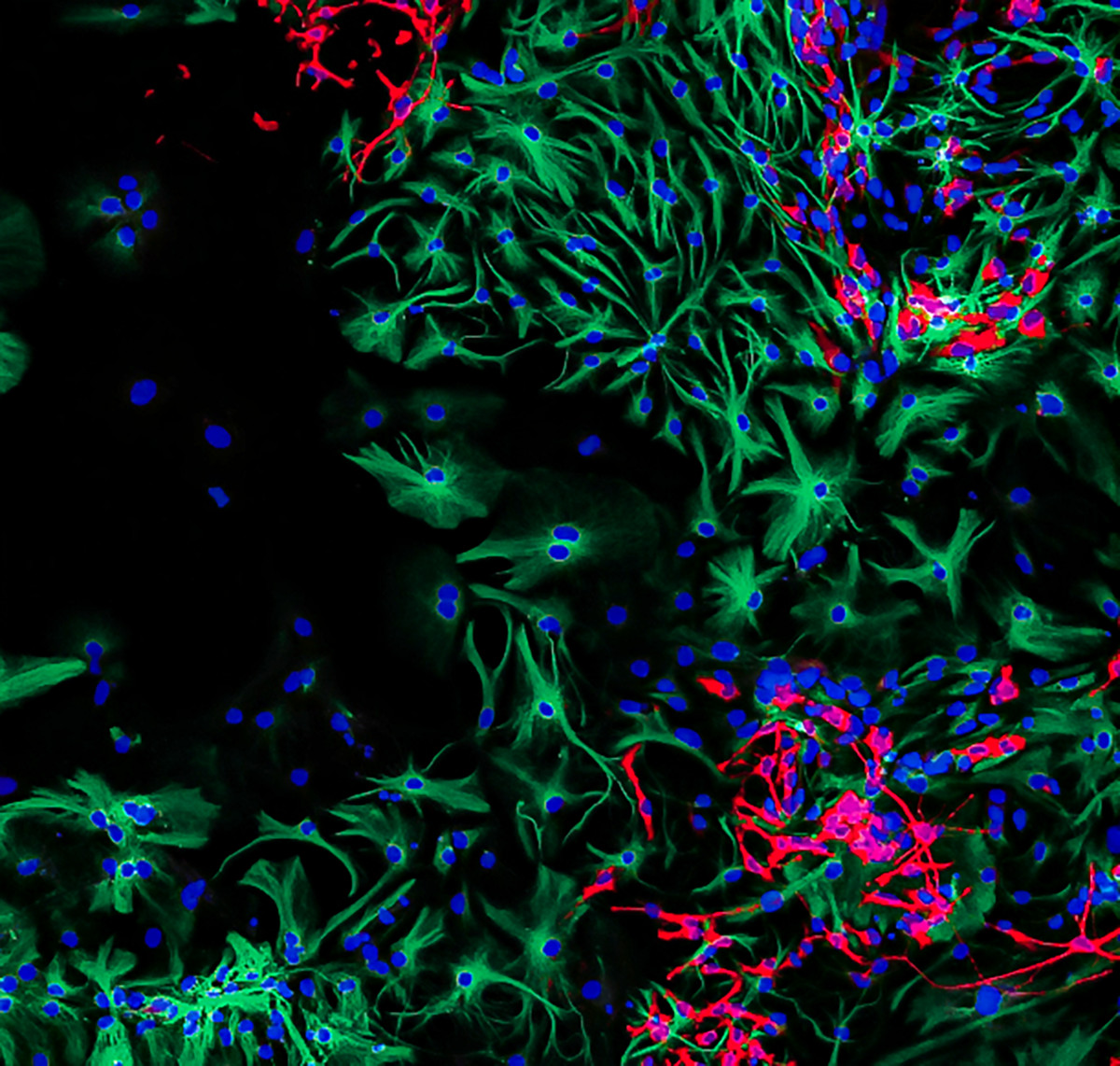
Image caption: Sumana’s winning image was taken using a technique called confocal microscopy and shows neural stem cells from mice which are being used to study glioblastoma, an aggressive type of brain cancer. The cells were genetically modified and exposed to a virus to develop glioblastoma, before mice were treated with microRNA repressors and activators to change how the cells grow in the brain and specialise.
“I love working in science as it has changed how I interact with the world, providing a more inquisitive lens through which to view it,” she says. “Working in cancer research is demanding but also rewarding in so many ways. By advocating and actively working in children’s cancer research, I hope to contribute as much as I can to improve this field.”
The ICR’s annual Science and Medical Imaging Competition showcases the often unseen beauty of science and medical research from researchers from the ICR and The Royal Marsden NHS Foundation Trust.
View previous winners and shortlisted entries
Melina Beykou – biomedical engineer
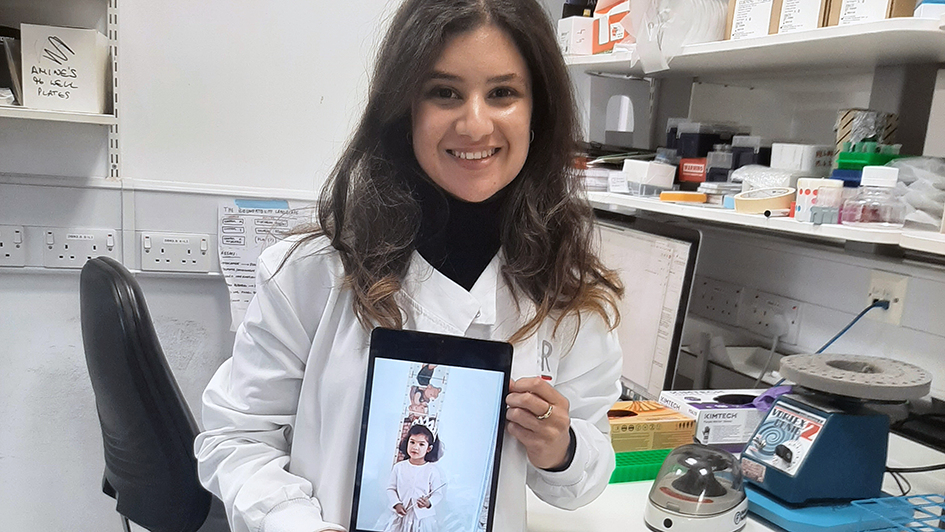
Image: In 2020, Melina Beykou joined Professor Chris Bakal’s Dynamical Cell Systems Team Cancer Morphodynamics lab on an affiliate studentship with Imperial College London.
Melina brings an electrical and electronic engineering perspective to cancer research. She is a Cancer Research UK Convergence Science Centre PhD student – a strategic partnership between Imperial College London and the ICR that brings together engineering, physical sciences, life sciences and medicine to develop innovative ways to address challenges in cancer research to benefit cancer patients.
For her PhD, Melina is adapting a ‘lab-on-a-chip’ device that can detect real-time pH changes in the tumour microenvironment of triple negative breast cancer. Cancer cells are known to acidify their tumour microenvironment, so measuring acidity levels through pH changes could be a novel way to assess cancer in the clinic.
While growing up, becoming a scientist didn’t cross Melina’s mind. “I have to admit that I imagined myself in many professions, from a lawyer to an artist and even a historian. The one that stuck with me through adolescence was a ballet dancer!”
But by her A-levels, with the help of an enthusiastic teacher, Melina’s aspirations had changed.
“Shoutout to Mr. Macklin, who inspired me to apply myself to biology classes and instilled in me a fascination for human biology in particular.”
With Mr Macklin inspiring her to pursue a BSc in Biological Sciences, it was time for another role model to shape Melina’s journey – Dr Alexander Potocnik, a lecturer in immunology at the University of Edinburgh.
“During lectures he spoke in such a way where you could tell that he was truly fascinated by the intricate network of the immune system,” she explains. “He was the person who inspired me to pursue cancer research specifically.”
“Both Mr Macklin and Dr Potocnik had a passion and excitement when they spoke about their subjects, regardless of whether they had taught the class dozens of times before. I owe a lot to them both – they led me to become a passionate scientist who loves the ‘every day’ of scientific research.”
And whilst cancer research can be a “real challenge of persistence and patience at times”, Melina says “the excitement of individuals, especially cancer patients, when explaining your research to them makes every moment of struggle worth it.”
Isabel Nichols – clinical trial laboratory technician
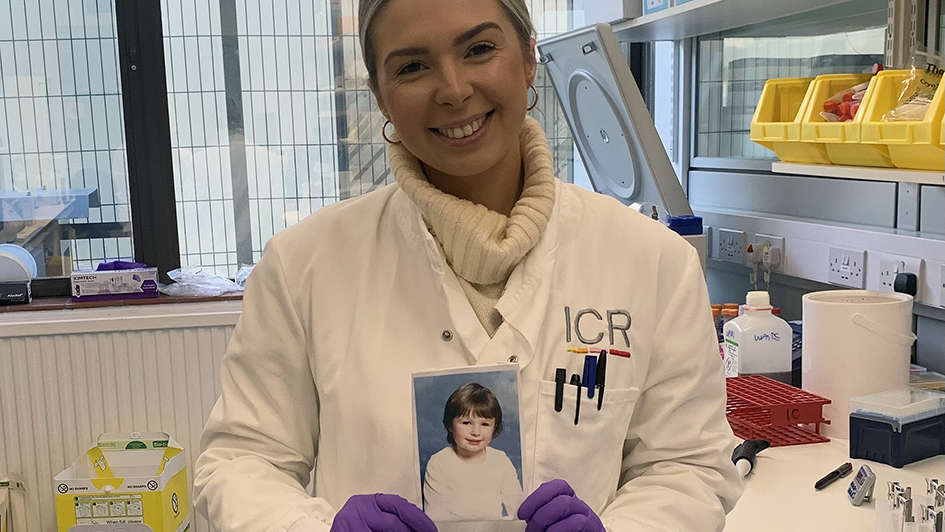
Image caption: Isabel Nichols is a Scientific Officer in the Genetics and Epidemiology Myeloma Molecular Therapy team, led by Dr Martin Kaiser.
Despite thinking she would undertake a career in video game programming, Isabel’s mum inspired her to follow science. “My mum recognised my enthusiasm for science when I would relay all the facts about the human body, I had learned that day in a biology lesson. She showed me that I could feel this way all the time by pursuing this passion as a career,” she says.
“When I was applying for University, my A-level subjects comprising of biology and two essay subjects didn’t align with the majority of the entry requirements, and I had essentially given up hope that science would be an achievable career for me. My mum researched around and found a college course that would allow me to progress to higher education and showed me that a Biomedical Sciences degree would expand on everything I loved about biology at school. She knew that this was what I was meant to do as a career and believed in me when I didn’t believe in myself. She has truly shaped my career for the last 10+ years.”
Isabel describes how her love of research has grown over the years and how its shaped her.
“I have loved discovering that science isn’t just about test tubes and chemicals; it’s collaborative, challenging, and exciting. I love how science has empowered me to become a better problem solver and taught me resilience. Everyone works towards a common goal, and I find this extremely motivating,” she says.
“I am passionate about cancer research because we are making discoveries that are changing people’s lives, and not just those with cancer but their families and friends. Like many people, I have lost loved ones to cancer. Research gives us hope that someone else will not have to go through the same heartbreak.”
Erica Oliveira – cancer evolutionary geneticist
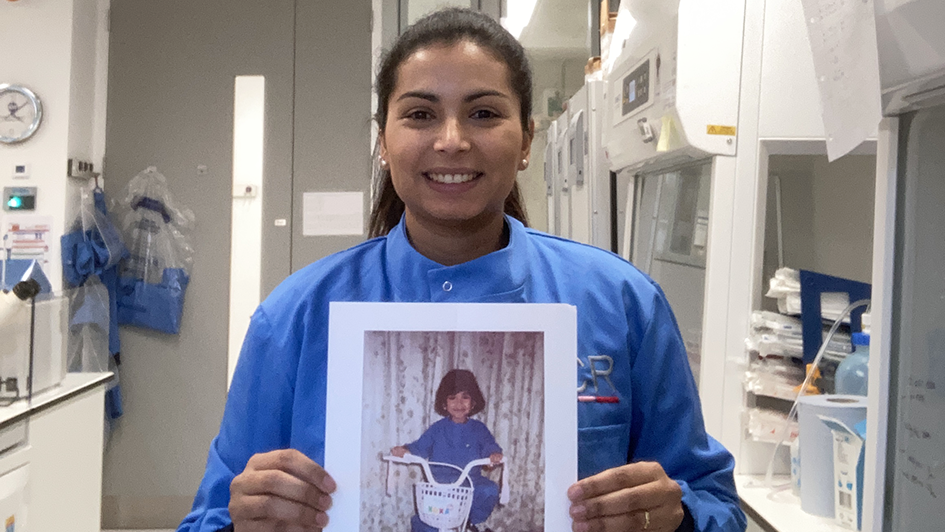
Image caption: Dr Erica Oliveira is a Postdoctoral Training Fellow in the ICR’s Evolutionary Genomics and Modelling team.
In her current project, Erica is using colorectal tumour organoids to investigate the relationship between chromosomal instability and resistance to chemotherapy.
“We have a system to track the same subclones over time and, together with DNA and RNA sequencing, we will be able to understand which subset of cells are involved in the emergence of resistance cells and which molecular mechanisms are responsible. Hopefully, in the future, we can translate these findings into better treatment approaches to the patient,” she explains.
Erica was inspired to pursue science after watching a wacky scientist on a TV show called Beakman’s World.
“The show was entirely based in science. I was amazed by the idea of understanding how the human body works and in using this understanding to unravel something new to people,” she says. “My favourite episode was one where they built a huge nose in the set and walked inside showing how the nose looked like from the inside. I was around eight years old but already knew that I wanted to do the same.”
However, Erica didn’t always want to be a scientist, the first career she considered was becoming a surgeon.
“I wanted to see the inside of the body and the organs working but, when I realised you do this with real people and the thought of all the responsibility involved, I decided to go into the backstage as a scientist and discover the cure for cancer. Unfortunately, later I realised that it is not so simple.”
She is extremely passionate about her research. “I love the feeling of being useful to humanity somehow. What motivates me is the belief that I am using my life and my time to try to find ways to improve other people’s lives,” she says.
“Even though science has got to this incredible speed lately, I believe that there is still so much to be understood. I think that in a few years we are going to re-write everything that seems so fundamental at this moment, as we have been doing with the fundamentals from the last century. I love the feeling that there are things out there for us to find out.”
At the ICR, we aim to create a supportive work environment and provide good career support for everybody. Here we shine a spotlight on some of the many fantastic women leading the way at the ICR.